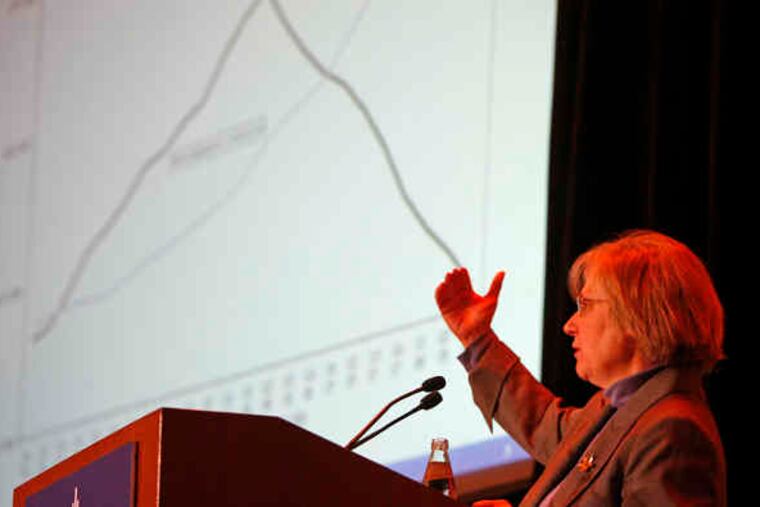Gore, Goldman executive discuss economy
In speeches yesterday in Philadelphia, a Goldman Sachs strategist said the U.S. economy was not "the 1930s revisited," and Al Gore said short-term thinking had been catastrophic for capitalism.

In speeches yesterday in Philadelphia, a Goldman Sachs strategist said the U.S. economy was not "the 1930s revisited," and Al Gore said short-term thinking had been catastrophic for capitalism.
The economy is in an era of swinging between extremes, Goldman's Abby Joseph Cohen said at the Greater Philadelphia Chamber of Commerce economic-outlook breakfast.
"In the course of six to nine months, many investors and many businesspeople have gone from one extreme, fearing rip-roaring inflation, to the other extreme, fearing the extraordinarily negative consequences of deflation," said Cohen, senior U.S. investment strategist at the Goldman Sachs Group Inc.
"Our belief is that we are not entering a period of dramatic deflation. We do not think this will be the 1930s revisited," she said. "A true deflation is when incomes deflate not just for a few quarters, as we expect, but for a multiyear period."
Cohen said her firm predicted that the recession would end in six months or so, at least in terms of declining gross domestic product.
"We don't think this will be followed by extremely vigorous economic activity. First and foremost, the typical consumer is going to be careful for a long period of time, and that's appropriate," Cohen said.
Reasons for that, economists say, include the weak job market, the dramatic drop in housing prices in some parts of the country, and stock market declines, which have left many consumers feeling burned.
In the three years leading up to the start of the financial crisis in early 2007, the U.S. stock market went through a period of extraordinarily low volatility, less than half the historical average.
"It makes us feel comfortable. It makes us feel more comfortable than we should," Cohen said. "Investors were willing to take on more risk because they didn't see the usual jumpiness in prices," Cohen said.
That blew up in the fall, when stock market volatility shot up to nearly five times the historic average.
The bond market was even more extreme, with investors snapping up all sorts of risky bonds without demanding the usual increase in interest-rate spreads above virtually risk-free U.S. Treasury securities.
Now, Cohen said, spreads on "BBB" corporate bonds, the highest grade of junk bond, have increased to levels never seen before.
Current spreads "imply that the default rate will increase four times. Now we think there will be problems in some corporate debt, but will the default rate increase four times? On average, probably not," Cohen said.
Former Vice President Gore railed against the impact of short-term thinking on the environment and economy.
"In the banking business, in the investing business, in financial services generally, this short-term thinking has been catastrophic, and it has now gotten to the point where our system of American capitalism is itself really taking a major hit," Gore said. He spoke at a Center City event hosted by state Treasurer Robin L. Wiessmann and sponsored by PNC Financial Services Group.
"Vast areas of the financial system have been effectively nationalized now, and all around the world where they've looked to the United States as the leader of how we can organize democratic capitalism, the confidence in the American vision of how to do this has been shaken," Gore said.